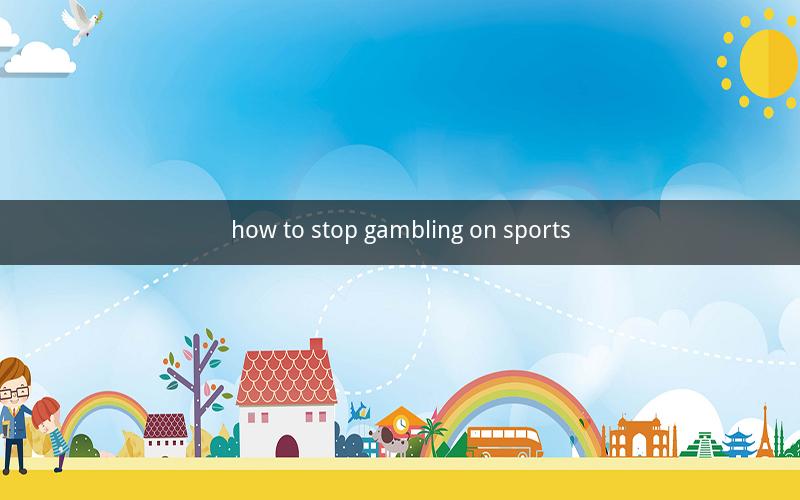
How to Stop Gambling on Sports: A Comprehensive Guide
Table of Contents
1. Understanding the Problem
2. Identifying the Signs of Problem Gambling
3. The Psychological Impact of Sports Gambling
4. Financial Consequences of Sports Betting
5. Strategies to Control Your Gambling Behavior
6. Seeking Professional Help
7. Building a Support System
8. Legal Implications of Sports Gambling
9. Alternatives to Sports Betting
10. Maintaining Sobriety and Long-Term Recovery
1. Understanding the Problem
Gambling on sports can be an enjoyable pastime for many individuals, but for some, it can quickly spiral into a harmful addiction. Understanding the nature of the problem is the first step towards overcoming it. Sports gambling addiction is characterized by an inability to control gambling behavior, despite negative consequences.
2. Identifying the Signs of Problem Gambling
Recognizing the signs of problem gambling is crucial in determining whether your betting habits have become harmful. Common signs include:
- Continuously chasing losses
- Borrowing money to finance bets
- Prioritizing gambling over personal responsibilities
- Feeling restless or irritable when not gambling
- Using gambling as a way to cope with stress or emotions
3. The Psychological Impact of Sports Gambling
Problem gambling can have profound psychological effects, including:
- Depression and anxiety
- Guilt and shame
- Relationship problems
- Suicidal thoughts
4. Financial Consequences of Sports Betting
The financial impact of sports gambling can be devastating. Some common financial consequences include:
- Unpaid bills and debts
- Loss of savings and investments
- Foreclosure or eviction
- Bankruptcy
5. Strategies to Control Your Gambling Behavior
Controlling gambling behavior requires a combination of self-discipline and support. Here are some strategies to consider:
- Set a budget and stick to it
- Keep a record of your bets and losses
- Avoid betting on your favorite teams or players
- Take breaks from gambling
- Use betting block tools or apps
6. Seeking Professional Help
If you're struggling to control your gambling behavior, seeking professional help is essential. Therapists, counselors, and support groups can provide the guidance and support you need to overcome your addiction.
7. Building a Support System
A strong support system can make a significant difference in your recovery journey. This may include family, friends, or support groups dedicated to problem gambling.
8. Legal Implications of Sports Gambling
It's important to be aware of the legal implications of sports gambling. While gambling on sports is legal in some jurisdictions, it's crucial to understand the laws and regulations in your area to avoid legal consequences.
9. Alternatives to Sports Betting
If you're looking to replace the thrill of sports betting, consider alternative activities that can provide a similar sense of excitement and engagement:
- Participate in sports or fitness activities
- Join a hobby group or club
- Attend live events or concerts
- Volunteer or engage in community service
10. Maintaining Sobriety and Long-Term Recovery
Maintaining sobriety and long-term recovery from sports gambling addiction is a continuous process. Here are some tips to help you stay on track:
- Set clear goals and milestones
- Continue to seek support from professionals and support groups
- Practice self-care and stress management techniques
- Stay away from triggers and risky situations
FAQs
1. What is the most effective way to stop gambling on sports?
- The most effective way to stop gambling on sports is to combine self-discipline, professional help, and a strong support system.
2. Can I recover from a sports gambling addiction on my own?
- While it's possible to recover on your own, seeking professional help and joining a support group can significantly improve your chances of long-term recovery.
3. How can I avoid relapse after overcoming a sports gambling addiction?
- To avoid relapse, it's important to continue practicing self-discipline, seek ongoing support, and stay away from triggers and risky situations.
4. What are the signs of a sports gambling addiction?
- Signs include chasing losses, borrowing money to bet, prioritizing gambling over personal responsibilities, and feeling restless when not gambling.
5. How does sports gambling affect my mental health?
- Sports gambling can lead to depression, anxiety, guilt, shame, and relationship problems.
6. Can I still enjoy sports without gambling?
- Absolutely, there are many other ways to enjoy sports, such as participating in sports activities, watching games, or supporting local teams.
7. What are some legal implications of sports gambling?
- Legal implications vary by jurisdiction, but it's important to be aware of the laws and regulations in your area to avoid legal consequences.
8. How can I build a support system for my gambling addiction?
- You can build a support system by reaching out to friends and family, joining support groups, and seeking professional help.
9. Are there any alternative activities to sports betting?
- Yes, there are many alternative activities, such as sports, fitness, hobbies, and community service, that can provide a similar sense of excitement and engagement.
10. How long does it take to recover from a sports gambling addiction?
- Recovery from a sports gambling addiction is a lifelong journey. Some individuals may experience setbacks, but with persistence and support, many can achieve long-term recovery.